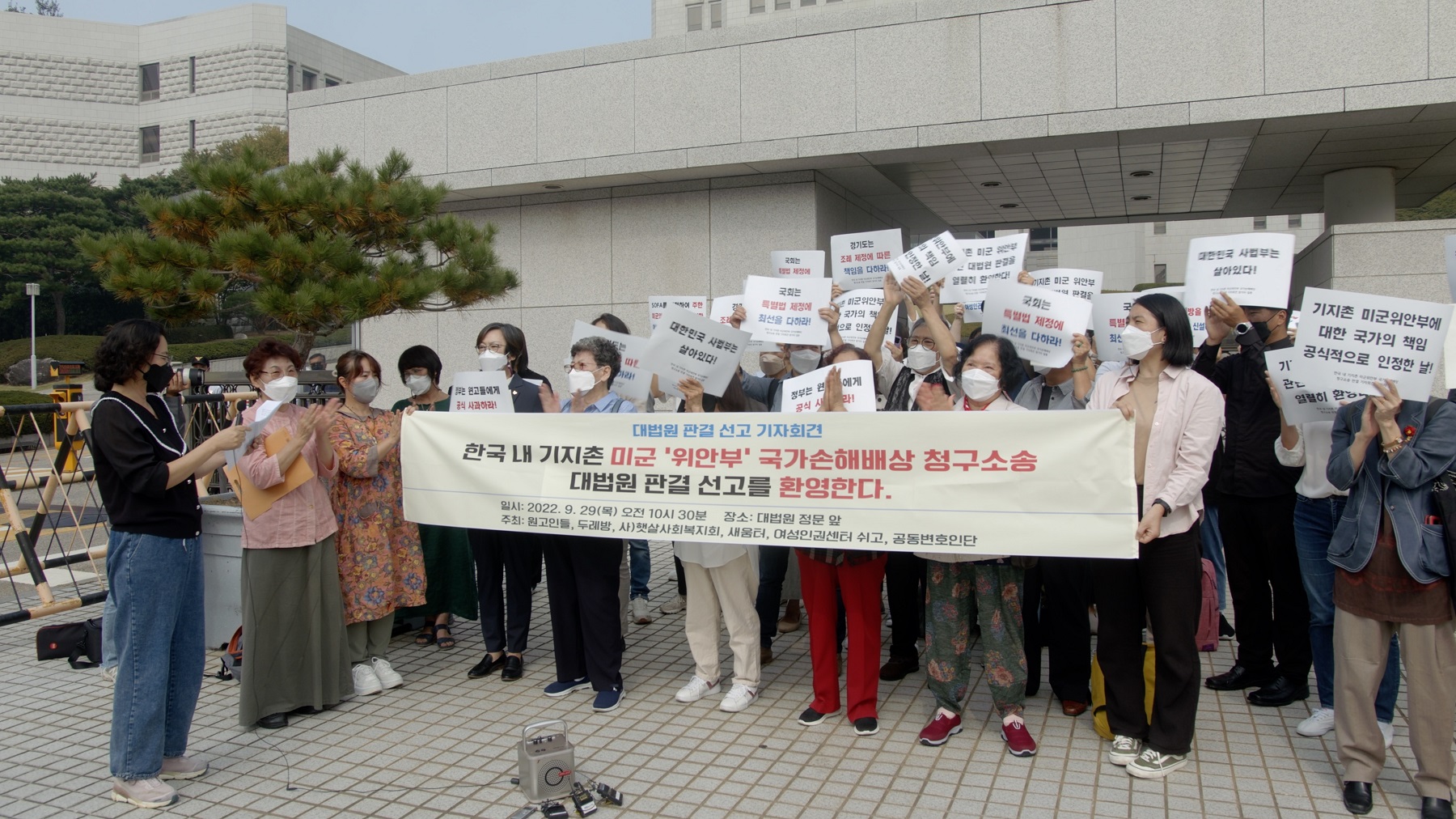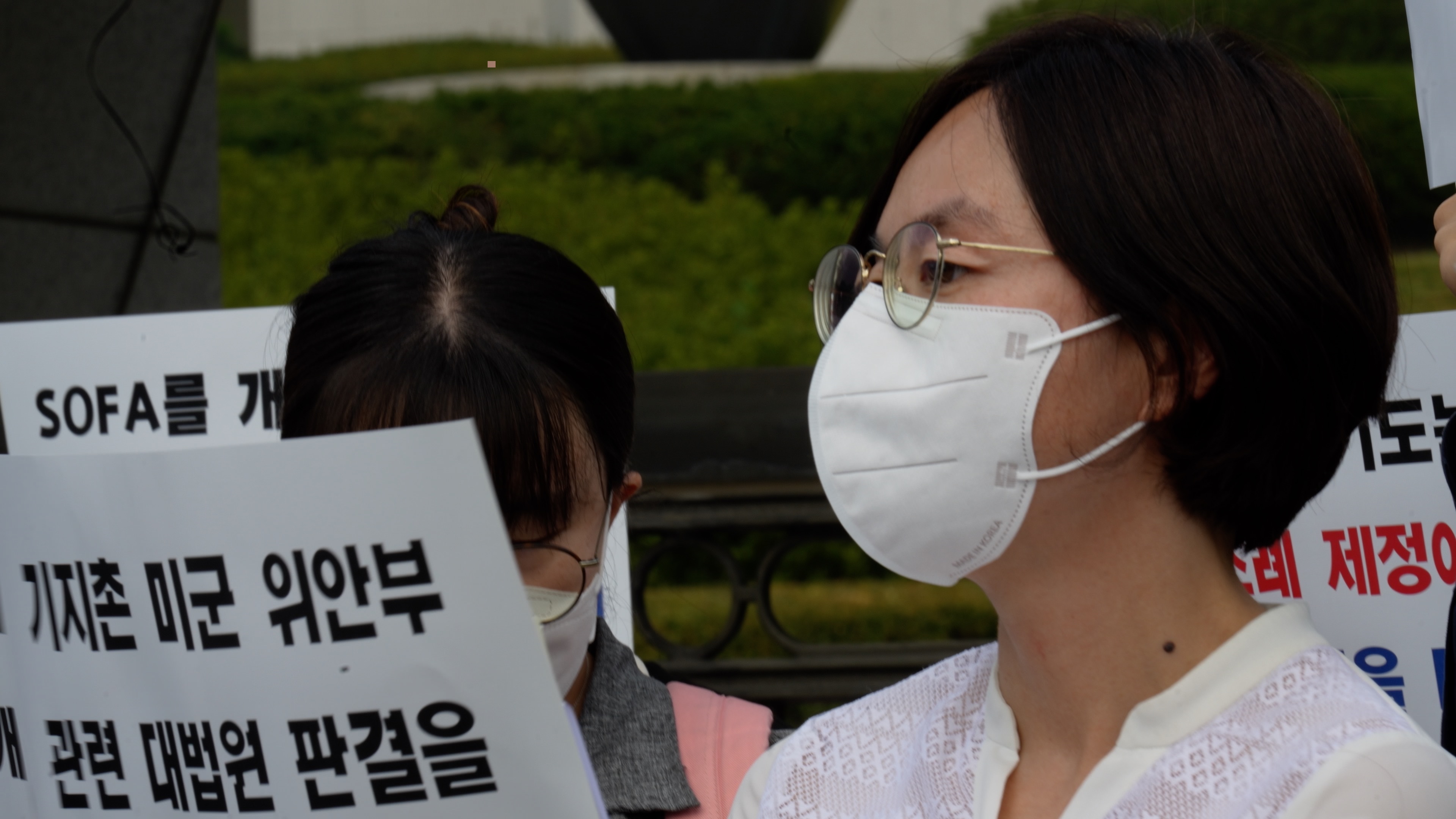1.
On September 29, 2022, at 10:00 a.m., the Justice read out the judgment for a case in Courtroom 1 of the Supreme Court.
“The final and incidental appeals for the state Compensation Case 2018 (c) 224408, filed by Lee ○○ and 95 others against the state, have been dismissed. As per the judgment, the costs of the final and incidental appeals will be borne by each party involved.”
After the judge delivered the brief judgment, there was a moment of silence in the courtroom before the audience began to stir. The plaintiffs, women from military camp towns, and the activists who supported the lawsuit exchanged looks, trying to understand the ruling’s implications. Although initially taken aback by the quick decision, I soon realized that the dismissal of the final appeal meant that the second trial had been finalized and then felt a surge of joy in my heart. Once the trial participants left the courtroom, they surrounded one of the plaintiff’s attorneys, Ha Joo-hee, in a circle. She was beaming with a smile and celebrated the sweet victory in a loud voice. It was only then that the waves of relief and joy spread throughout the group. On June 25, 2014, after eight years and three months since the lawyers submitted the complaint on behalf of 122 plaintiffs, the plaintiffs finally emerged victorious in the lawsuit against the state.
2.
The defense team presented four reasons for filing the compensation lawsuit against the state as follows: ①The Korean government created, systematically managed, and maintained military camp towns to facilitate prostitution. ②The government designated these areas as “specific regions” and referred to the women working there as the “Comfort Women” for U.S. troops while conniving in prostitution and related illegal acts. ③The government systematically and violently managed Sexually Transmitted Diseases (STDs). ④The government justified and promoted prostitution for U.S. soldiers while conducting “patriotism education” from time to time and managing “autonomous organizations.”
However, in the verdict of the first trial reached on January 20, 2017, the court only recognized the reason ③: the systematic and violent management of STDs. The Prevention of Contagious Diseases Act amended in 1963 stipulated that “the person among patients with the third class contagious diseases, including STDs, prescribed by the ordinance of the competent ministry, shall be quarantined and receive treatment in detention facilities” under Article 29 ②of the Act. However, the Enforcement Rule of the Prevention of Contagious Diseases Act, corresponding to the ordinance of the Ministry of Health and Social Affairs and specifying the person subject to quarantine, was only enacted on August 19, 1977. As a result, prior quarantines in detention facilities lacked legal grounds and were deemed illegal acts. Consequently, the court ordered the state to pay 5 million won (around USD 4000) in compensation to 57 plaintiffs who had been quarantined before the Enforcement Rule of the Prevention of Contagious Diseases Act was established.
Both the plaintiffs and defendant were dissatisfied with the verdict and appealed. On February 8, 2018, the appeals court held the state responsible more broadly. First, the scope of reason ③, the systematic and violent management of STDs, which was partially recognized by the first trial verdict, was expanded in the second trial. Even after the Enforcement Rule of the Prevention of Contagious Diseases Act was enacted, the court ruled that “it was illegal to immediately quarantine the “Comfort Women” for U.S. troops suspected of STDs in detention facilities.” This is because the compulsory internment of “persons suspected of STDs” without a medical diagnosis violated the constitutional right to physical freedom. The court also ruled that the compulsory internment of “persons suspected of STDs” was illegal in that it violated public officials’ duty to respect human rights and lacked objective legitimacy.
Second, the second trial verdict recognized the state’s responsibility for ① creating, managing, and operating military camp towns, and ④ justifying and promoting prostitution, which were denied in the first trial. The court acknowledged that the promotion and justification of prostitution took place throughout the operation and management of tmilitary camp towns, in that the state actively demanded that the plaintiffs engage in prostitution for the foreign soldiers and actively pursued the promotion of foreign military morale and the acquisition of foreign currency through this. In addition, the court judged that the public officials in charge actively encouraged and justified prostitution by conducting patriotism education and deceiving the plaintiffs through false promises such as housing benefits or guaranteeing old-age income security.
However, the court dismissed the plaintiff’s claim that ② the state exempted and neglected the crackdown on illegal acts due to insufficient evidence and also rejected the defendant’s claim that the statute of limitations had been completed. Based on the above judgment, the court ruled that the state shall compensate 7 million won (around USD 5,500) to 74 plaintiffs who were recognized for ①, ③, and ④, and 3 million won (around USD 2,350) to the remaining 43 plaintiffs who fall under ① and ④. The Supreme Court confirmed the second trial verdict about four years and eight months later. During those 8 years and 3 months, 24 of the original plaintiffs died, and 3 people who could not be reached are also estimated to have died.

3.
The admission by the judiciary that the Korean authoritarian government was responsible for not only creating, managing, and operating military camp towns but also actively justifying and promoting prostitution was the result of the courage and dedication of many people. Women’s rights movement organizations active in military camp towns led the lawsuit, and numerous organizations, including the My Sister’s Place, the Sunlit Sisters’ Center, the National Campaign for Eradication of Crimes by U.S. Troops in Korea, Hansori Society, Women’s Human Rights Center Shego, the Korean Council for the Women Drafted for Military Sexual Slavery by Japan, and Solidarity for Gijichon Women’s Human Rights formed by the Gyeonggi Women’s Solidarity, recruited plaintiffs and recorded testimonies from March 2014. In March 2014, the Saeumteo, another field organization, published the “History of the ‘Comfort Women’ for U.S. Troops,” a collection of government documents and media reports related to the military camp town, and collected the testimonies of the plaintiffs.
Lawyers fought in court on behalf of the plaintiffs. The lawyers affiliated with the Lawyers for a Democratic Society reviewed relevant research and literature to prepare a legal review statement from 2012 at the request of the Solidarity for Gijichon Women’s Human Rights and the Saewoomtuh. In March 2013, the lawyers prepared the first legal review statement, formed a large-scale defense team of more than 20 lawyers, and filed the lawsuit. The lawyers, along with activists, drafted plaintiff statements and collected 547 pieces of extensive evidence to present to the court.
Various experts from different fields conducted research, which was used to support the construction of lawyers’ jurisprudence, and provided testimonies in court. The research began with Katharine Moon’s “Sex among Allies” (translated by Lee Jeong-ju, Samin, 2002/original publication 1997), which established the responsibility of the Korean government for the formation, management, and human rights violations in military camp towns. Studies conducted by Katharine Moon, Na-Young Lee, and Jeong Mi Park were submitted as evidence, and Na-Young Lee and Jeong Mi Park testified as experts in the first and second trials, respectively. Dr. Mun Jeong-ju, who worked as a medical officer at the Uijeongbu Public Health Center from 1995 to 1997, and photographer Jo Yeong-ae, who documented the Paju military camp town and interviewed officials involved in STD control, provided testimony during the first trial.
However, the most significant aspect of this lawsuit is that the plaintiffs themselves, the “Comfort Women” for U.S. troops, played a central role in the struggle. The 122 plaintiffs represented tens of thousands of the “Comfort Women” for U.S. troops from Korea’s liberation to the mid-1990s. As with the Japanese military “Comfort Women” movement, the testimony of the victims was essential in making this lawsuit a success. The statements and interview reports of the plaintiffs were submitted to the court as evidence, and the court accepted them in its admission of facts. Additionally, four of the “Comfort Women” for U.S. troops testified in court. As such, the court found their testimony credible and ruled in favor of the plaintiffs. One of the plaintiffs delivered her final statement at the second trial as follows:
We had no country to call our own. In an attempt to escape, we sought help from the police, only to be returned to our pimp. We were then forced to undergo painful and humiliating STD examinations twice a week at the public health center. Even when we did not have any STDs, we were still treated like prisoners and given penicillin injections as an excuse for “clean-up” (crackdowns) and “contact” (interning women accused of transmitting STDs by an American soldier). The public health center refused to provide us with any other medication, even when we were seriously ill... It is incredibly unfair that we were forced to live a life where on the one hand we were praised as “dollar-earning patriots” but on the other, treated as outcasts by society.
The most persecuted women in Korean society and paradoxical beings known as “patriots without the state” have finally won against the Republic of Korea.
However, this victory is just the beginning, not the end. The compensation amounts of 3 to 7 million won (around USD 2,350–5,500) are woefully inadequate compared to the suffering of the plaintiffs. A special law must be passed to reveal the truth about how they were victimized by and for the state, and to fully compensate them for the harm they endured. The Ordinance on Support for Camptown Women in Gyeonggi Province, which was enacted in 2020 but is famously ineffective, must be properly enforced. Furthermore, this ruling only recognized some of the injustices committed by the state against the “Comfort Women” for U.S. troops. The human rights violations at the Woman Protection Guidance Office and vocational training institutions, two other facilities that housed “Comfort Women” for U.S. troops, were not included in the lawsuit’s cause. I hope that this verdict will inspire more survivors to find the courage to testify about their experiences, allowing Korean society to empathize with them and reflect on past violence and injustice and move forward into a new future.

- Writer Jeong Mi Park
-
Professor of Sociology at the Chungbuk National University, who has conducted research on subalterns and countries, including the “Comfort Women” for U.S. troops. She provided evidence to the compensation lawsuit for the “Comfort Women” for U.S. troops against the state and testified as an expert during the second trial.